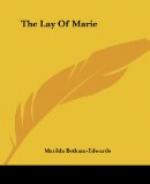Just were his boding fears:
new shouts ascend
Of loud acclaim; and wide
the welkin rend.
A female form the wondering
peers behold,
Too bright for mixture of
earth’s mortal mould:
The gridelin pall that down
her shoulders flow’d
Half veil’d her snow-white
courser as she rode;
On her fair hand a sparrow-hawk
was plac’d,
Her steed’s sure steps
a following grey-hound trac’d
And, as she pass’d,
still pressing to the right
Female and male, and citizen
and knight,
What wight soe’er in
Carduel’s walls was found,
Swell’d the full quire,
and spread the joy around.
Lanval, the while, apart from
all the rest,
Sat sadly waiting for his
doom unbless’d:
(Not that he fear’d
to die: death rather sued;
For life was nought, despoil’d
of all its good:)
To his dull ears his hastening
friends proclaim
The fancied form and presence
of his dame;
Feebly he rais’d his
head: and, at the sight,
In a strange extacy of wild
delight,
’’Tis she! ‘tis
she!’ was all his faultering cry,
‘I see her once again
now satisfied I die!’
Thus while he spake, the peers
with seemly state.
Led by their king, the illustrious
stranger wait;
Proud Carduel’s palace
hail’d its princely guest,
And thus the dame the assembled
court address’d.
’List, king, and barons!—Arthur,
I have lov’d
A knight most loyal in thy
service prov’d;
Him, by thy foul neglect,
reduc’d to need,
These hands did recompense;
they did thy deed.
He disobey’s me; I forbore
to save;
I left him at the portal of
the grave:
Firm loyalty hath well that
breach repair’d—
He loves me still, nor shall
he lack reward.
’Barons! your court
its judgment did decree,
Quittance or death, your queen
compar’d with me:
Behold the mistress of the
knight is come,
Now judge between us? and
pronounce the doom.’
All cry aloud, the words of
love were right,
And one united voice acquits
the knight.
Back from the palace turns
the parting fay,
And with her beauteous damsels
speeds away:
Her, as she pass’d the
enraptur’d Lanval view’d;
High on the portal’s
marble steps he stood;
On his tall steed he sprang
with vigorous bound;
Thenceforth their footsteps
never wight hath found.
But ’tis the Breton
tale, they both are gone
To the fair isle of fertile
Avalon;
There, in the lap of love
for ever laid,
By sorrow unassail’d,
in bliss embay’d,
They make their won:
for me, where’er they dwell,
No farther tale befalls me
here to tell.
Thomas Chestre translated this tale in the reign of Henry 6, but the extracts published by Mr. Warton, differ in some particulars from the tale here given.
No. VI.—LES DEUX AMANTS.




